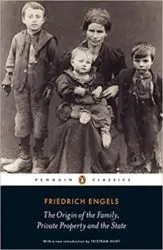
Friedrich Engels, Origins of the Family, Private Property, and the State
Engels, Friedrich. Origins of the Family, Private Property, and the State. 1884.
Review by Hayyim Rothman
Domestic labor has been a central concern to Marxist theorists since the nineteenth century. In his Origins of the Family, Private Property, and the State, Friedrich Engels discusses what he and Marx termed “the first division of labor” in The German Ideology, written in 1846. The first division, according to the theorists, is “that between man and woman for the propagation of children.” Engels argues that the sexual division of labor is a significant problem for contemporary labor.
In his anthropological reconstruction of family economics, Engels argues that the institution of marriage is an unequal division of labor that was “relatively a step backward, in which prosperity and development for some is won through the misery and frustration of others.” Marriage, then, serves as a microcosm of society, and thus provides lessons for how to escape an exploitative capitalist system.
Engels contrasts what he terms the “communistic household” with the modern family. A communistic model, made up of multiple couples and their children, gives women a public and socially necessary role, while the modern, individualistic family turns women’s labor into a private service. Engels argues that “the modern individual family is founded on the open or concealed domestic slavery of the wife.” This family structure has far reaching consequences for both sexes, as well as for society.
This wage inequality between men and women reinforces male supremacy by placing more power in men’s hands. Labor, Engels implies, only confers stature and power when it has a public function. Women’s labor is not part of the public realm under the monogamous family social structure. Therefore, though women’s labor takes labor time, it does not have value; it cannot be exchanged for an equivalent because, being private, it has no common equivalent.
Again, Engels sees the family is a microcosm of the larger state. “Within the family, he is the bourgeois and the wife represents the proletariat.” The husband, who enjoys the fruit of this labor, functions as the bourgeois because––though the wife is paid in room and board––the value he extracts from his wife far exceeds the cost of her upkeep.
Engels’ solution to this is to bring women into “public industry” in order to give their labor value. He argues that only the proletarian wife, who is able to earn wages for her labor, can break the exploitative cycle. Women thus need to move from the private sphere, where their labor has no value, to the public sphere, where they, too, can benefit from their work.However, with the post-modern rise of immaterial labor, we see the fallacy of Engels’s solution. Public industry has been re-inserted into the private, or domestic, realm. The old distinction between public and private has been abolished. This creates new opportunities for exploitation; it is no longer just a matter of men exploiting female labor, but of labor itself becoming “feminized” in the sense that it takes place outside of the traditional workplace and in many respects outside of the sorts of legal and institutional protections that were developed throughout the twentieth century. Similarly, even as millions of women entered the workforce, many of the problems identified by Engels in the nineteenth century still persist.
Return to the reviews or the annotated bibliography
Hayyim Rothman has a PhD in Philosophy from Boston College and recently received a Fulbright postdoctoral research fellowship to work at Bar Ilan University in Israel.